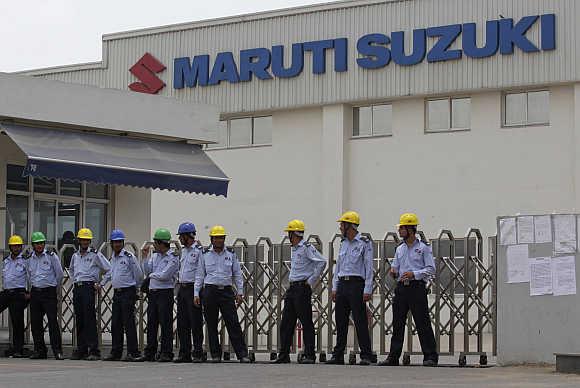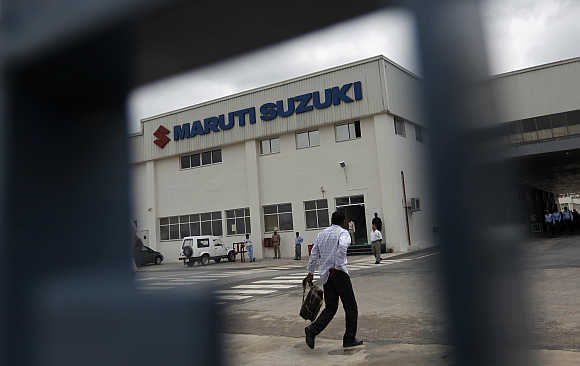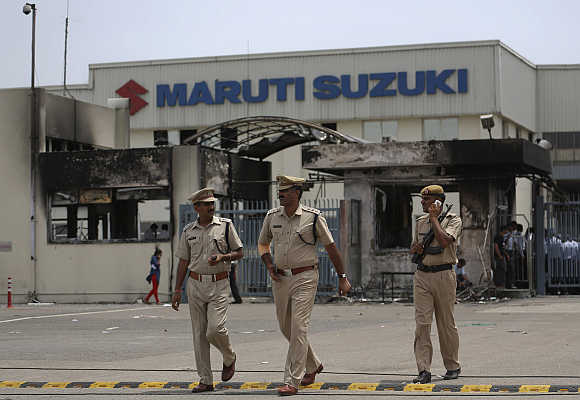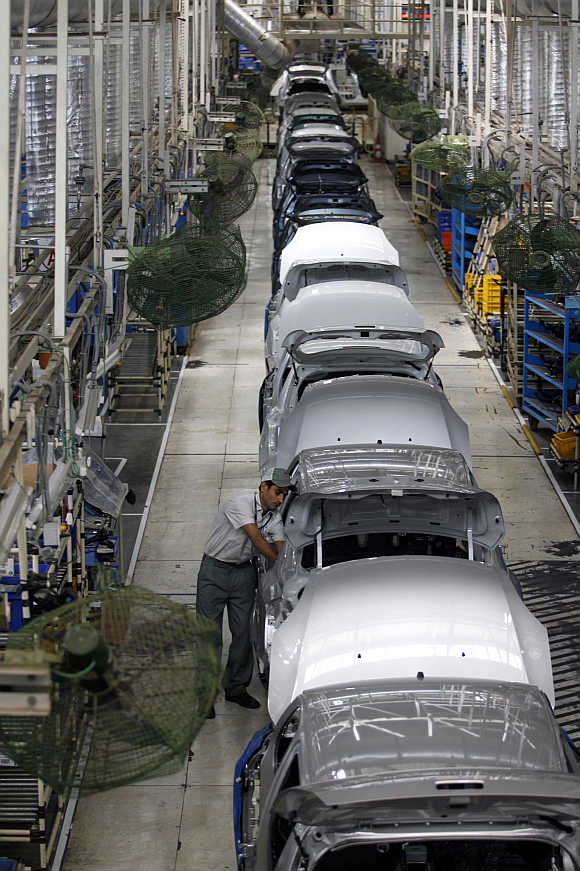 | « Back to article | Print this article |
Has Maruti found a solution for its labour woes?
In the worst outbreak of labour violence in Maruti Suzuki's 29-year history, a senior human resource executive was killed and scores of officers injured at the company's factory at Manesar in Haryana on July 18.
Soon thereafter, the company dismissed a third of its regular workforce at the unit, declared an indefinite lockout (it was lifted a month later) and, in its single-largest human resource initiative, announced it would stop hiring contract workers. Till then, these contract workers made up a significant portion of the company's total workforce across its factories at Gurgaon and Manesar.
The charge sheet filed by the Special Investigation Team constituted by the Haryana government in October this year which said that the violence was not influenced from outside but stemmed from internal issues between the workers and the management. Maruti Suzuki has refused to comment on the findings of the investigation but has taken a few measures to ensure that labour unrest does not recur at its factories.
For one, the company has undertaken a programme to regularise all contract workers engaged in core production activities across its five factories in Gurgaon and Manesar. The trouble in all the strikes has emanated from the contract workers who get paid lesser than regular employees, don't get social security benefits and depend on the whims and fancies of the manpower contractors for their livelihood.
Click NEXT to read more...
Has Maruti found a solution for its labour woes?
While the screening and critical examination procedures for the 1,870 contract workers at Manesar (who worked at the factory prior to the incident on July 18) are underway, the regularisation of contract workers at Gurgaon will commence around March 2013.
The entire recruitment process is now routed through the company's own human resource department. In the new dispensation, manpower contractors will not be in the picture at all. According to the plan, Maruti Suzuki will have a workforce of 4,500 at Manesar by the end of this month. In fact, daily production at the unit has increased by 15 per cent to 1,950 vehicles from 1,700 vehicles rolled out before July 18. The company had previously been taking a large number of workers from contractors on a casual basis to meet cyclical demand of the car industry.
These workers can be offloaded during the lean months and can be re-hired when the demand picks up. That's because the country's inflexible labour laws make it impossible to adjust the regular workforce in tune with the ups and downs of the market. "Contract workers are used largely because companies require flexibility," Maruti's Chief Operating Officer (administration) S Y Siddiqui had earlier told Business Standard. "Business has become so competitive that industry has stumbled upon this per force."
Click NEXT to read more...
Has Maruti found a solution for its labour woes?
Two, the company has increased wages by a record 50 per cent for permanent workers at its Manesar and Gurgaon facilities. Gross salary has been increased by Rs 14,800 per month spread over a period of three years for these workers. While they will get 75 per cent of the increment in the first year, 12.5 per cent each will come in the second and third years. "We are working out increments for technicians as well", Siddiqui had said at the time of inking the wage pact with the workers.
The gross salary of an entry-level worker in the company was Rs 23,500 per month. According to the new wage structure, the average entry-level salary will increase to Rs 37,800 per month over the next three years. For an experienced worker at Gurgaon and Manesar, the increased salary will stand at Rs 51,800 and Rs 39,800, respectively.
The wage pact had benefited around 2,800 workers at Gurgaon and around 700 workers at Manesar. Besides, the company has offered an additional Rs 1,000 in an ad hoc payment to workers, travel allowance of Rs 1200 every month, interest-free personal loans of up to Rs 20,000 and doubled insurance coverage to Rs 5,500.
Click NEXT to read more...
Has Maruti found a solution for its labour woes?
Dearness allowance has been made variable so that it will take into account all inflationary pressures. The revision is considered to be very healthy, considering that the company had given an increment of Rs 9,300 per month when wages were revised last in 2009.
Despite the handsome increment offered by Maruti Suzuki in the new wage agreement, the company's wage bill is expected to remain the lowest among listed automobile companies. The company's wage bill is expected to increase by Rs 65-70 crore per annum because of the increments. Maruti Suzuki Chief Financial Officer Ajay Sheth had informed recently: "Because of the settlement and regularisation of contract workers, the wage bill will increase by 0.15-0.3 per cent of the net sales over the next two year".
According to estimates available with industry experts, Maruti Suzuki reported employee benefits of Rs 843.8 crore (Rs 8.43 billion) in the last financial year, which amounted to 2.4 per cent of the company's net sales. It is also worth noting that Maruti Suzuki has chosen Gujarat for its expansion in the future.
Though the company has denied it, there has been speculation that the widespread labour unrest in the Gurgaon-Manesar industrial belt could have played a role in this decision. Maruti Suzuki did not comment on this article.
Click NEXT to read more...
Has Maruti found a solution for its labour woes?
In the four instances of labour unrest that Maruti Suzuki has had to grapple with in the course of about a year since June 2011, the company has lost production of around 150,000 units. To put the number in perspective, Toyota had sold 160,000-odd units in the country in the last financial year.
Industry estimates suggest that the company has incurred revenue losses to the tune of Rs 5,000 crore (Rs 50 billion). While the regularisation of contract workers and the wage increments may serve to ease out strains in industrial relations within the company, some concerns remain.
Deepesh Rathore, managing director, HIS Automotive India, a consultancy firm, says: "Wage increments should be given to as many eligible workers as possible because financially it does not make a big dent in the profitability of a car maker; but a plant shutdown is a big setback which results in significant revenue losses. But if there continues to remain a significant disparity between the wages of temporary and permanent workers in the company, there is bound to be differences in the workforce."
Rathore explains that labour problem of the magnitude that was witnessed at Maruti Suzuki occurs due to the confluence of a variety of complex issues ranging from disparities in socio-economic living conditions within the same workforce to lack of identification with a company's work philosophy.
Click NEXT to read more...
Has Maruti found a solution for its labour woes?
"When a large number of contract or temporary workers within a company get paid a fraction of the salary earned by permanent workers, differences surface within the workforce. The living conditions of this section of workers are miserable, particularly when contrasted with the socio-economic parameters in the Guragon-Manesar region which has developed into one of the country's flagship industrial sectors.
"Besides, the worker may not be able to identify with the strict work culture of a Japanese company or there could be a complete lack of communication between the management and those on the shop-floor. All these issues need to be looked at."
Amitava Ghosh, senior vice-president and head (regulatory), TeamLease Services, India's largest human resource services company, says, "If Maruti Suzuki plans to sustain its operations in Manesar under such a volatile and perturbed environment, it should immediately form a committee where heads of local Gram Panchayats must be given a vital role.
"Also, some part of the activities should immediately be earmarked where female employees can be engaged. More the proportion of female worker less would be the chances of violation...It's all about trust building in the locality which may work as a great preventer of violence in near future."






